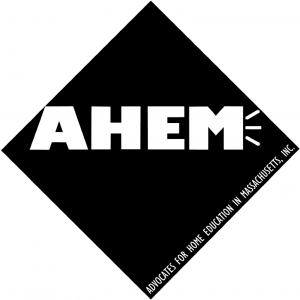
Do you have questions about how to start homeschooling?
We have answers.
Before You Begin
Before you begin, it makes sense to learn as much as you can about the realities of homeschooling. It’s a lifestyle choice and you’ll want to be thoughtful about whether it’s the right one for your family. The Coalition for Responsible Homeschooling in Boston has summarized some important questions to ask yourself before you start. There are also great works on child development and educational theory by some of the pioneers of homeschooling. Some of these are listed on our Library Resources page. To start with, here is a thorough but brief overview of the history of homeschooling, also from the Coalition for Responsible Homeschooling. At the end of this page, you’ll find some links and resources for parents just starting out with babies and toddlers.
Homeschooling Laws in Massachusetts
AHEM
If you’re curious about, considering, or have decided to homeschool in Massachusetts, the first place to look is the Advocates for Home Education in Massachusetts website. Otherwise known as AHEM, this organization is dedicated to helping homeschoolers in Massachusetts. It’s website is a one-stop shop for learning how to legally homeschool in the state. There are multiple laws that pertain to homeschooling in Massachusetts and AHEM’s main page offers links that summarize the various laws that affect homeschoolers. It also offers advice on how to report to your school district, as well as leads to some basic resources to help homeschoolers get started on the right foot.
If you’d like to read the laws for yourself, you can find them all linked here on one page of the mass.gov website.
How to Report — Writing Your Educational Plan
Massachusetts law requires you to submit an Educational Plan to your city’s School Department every year.
Start here on the AHEM website for tips on writing your Education Plan and click through for more examples.
 We’ve also provided a sample document that you can download and edit to include your child’s personal educational details.
We’ve also provided a sample document that you can download and edit to include your child’s personal educational details.
If you live in Haverhill, this document should be mailed (return receipt requested) to:
Superintendent of Schools
Haverhill Public Schools
4 Summer St., #104
Haverhill MA 01830
If you live in a different Massachusetts city or town, the Massachusetts laws will apply to you, however you should send your Education Plan to the Superintendent of your local public school department.
End-of-Year Progress Report
The law states that end-of-year reporting can be done by a “written progress report, standardized testing, or dated work samples.” (Charles 1987) It is up to you to decide how you will report and you may want to reach out to more experienced homeschoolers in the area to learn how they are reporting.
Click here for a sample progress report that you can download and edit to include your child’s personal educational details.
AHEM offers their advice here. And you can find their sample report here.
Here is the AHEM FAQ page which has many answers.
Starting with Babies & Toddlers
Early Literacy
The Children’s Department at the library offers plenty of story times and lap sits to help promote early literacy. Check here for the schedule of upcoming events and subscribe to our YouTube Channel for videos of virtual lap sits, crafts, and more! For fun, here’s one example: Colleen’s Fun with Felt Boards.
This page from the U.S. Department of Education offers information and resources to help parents encourage early literacy and reading readiness including the resource Helping Your Child Become a Reader which offers a multitude of tips and advice for people with children 0-6 years old and is available in English and Spanish.
Family & Community Connection in Haverhill serves young families with children 0-8 years old and partners with other local organizations like the Haverhill Public Library, the YMCA, and others to offer playgroups and other activity-based early literacy programs. Check here for their current classes.
Parenting and Homeschooling Styles
What type of homeschool family do you want to be? There are as many ways to be a homeschooler as there are families in the world. Every family is unique so homeschooling does not look the same from one family to the next. As your children grow, so will your own understanding of homeschooling. For parents with babies and toddlers, this means that you have plenty of time to figure it out, and it doesn’t have to be stressful. Check the catalog here for some books on attachment parenting, a gentle, connected method of parenting that often leads to homeschooling.
Many people come to be interested in Montessori methods by way of attachment parenting, but it is not a requirement. A wonderful summary of the Montessori philosophy can be found on the AgeofMontessori.org website:
“Montessori is the education of the whole child, including physical, emotional, mental, spiritual and social ways of being. It is a child-centered environment where children are given freedom to choose work based on their developmental needs and interests.”
Check out their website for more information about the Montessori philosophy of child development and education. In addition, this Montessori school has created a wonderful resources page which is another great place to start.
As you go through the rest of our Homeschool Resources pages, you’ll discover the many different ways you can homeschool. For example the Library Resources page has information about homeschool pioneers and their educational theories. And the Social Support page will lead you to places where you can meet other homeschoolers, both online and in person, some of whom will most certainly share their favorite resources and their wisdom.
If you have questions about any of the resources listed on these pages or want help finding additional resources, you can email us at kids@haverhillpl.org or give us a call at 978-373-1586 and ask for the Children’s Department.
